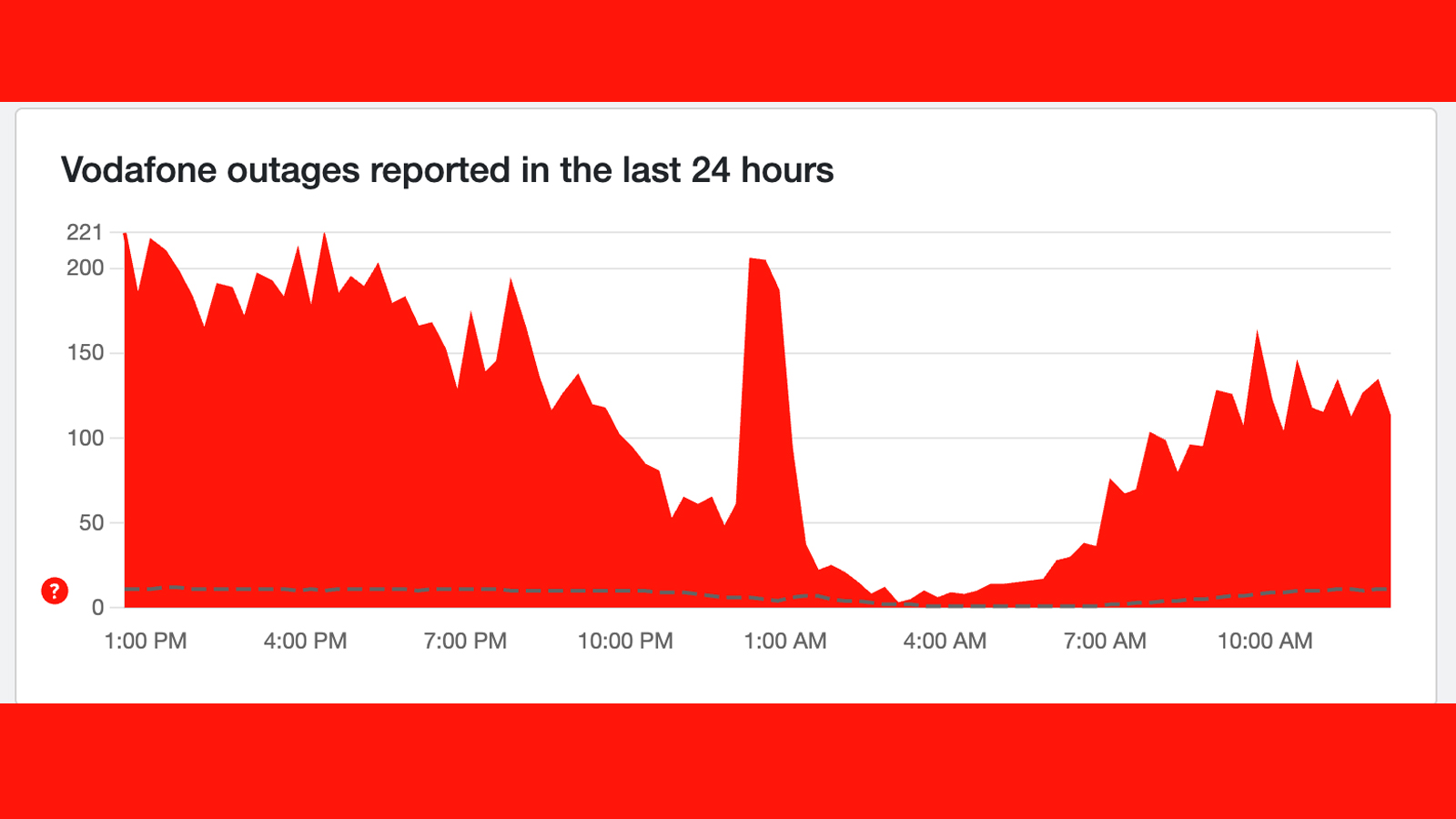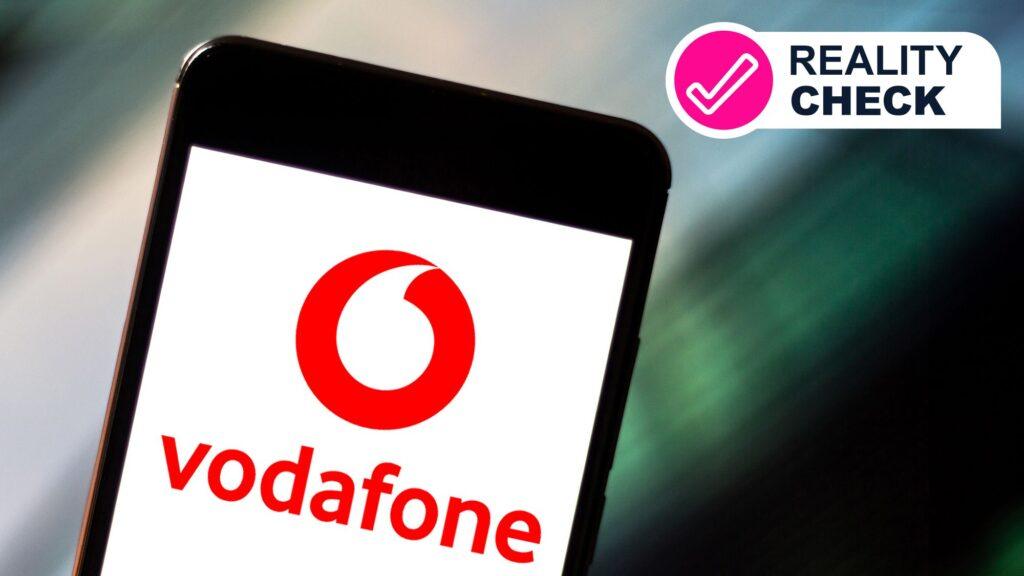It’s been a bad week for Vodafone customers. Not only was October 13 a major outage to network broadband, mobile internet services, website and customer service phone lines, but many are still experiencing knock-on effects.
The problems officially only lasted a couple of hours, around 2:30pm BST, and at the peak, more than 130,000 customers reported a complete blackout of their Vodafone services on Downdetector.
The magnitude of the outage made it one of the largest of the year, but hundreds of people continue to report lingering effects, with some still without broadband access for several days.
So what caused all these problems? What can we learn from it? And, more importantly, can customers obtain compensation for the considerable inconvenience they have experienced? We’ve asked the experts for their guidance below.
What caused the Vodafone outage?
Vodafone’s latest statement on its major blackout on October 13 dismissed suggestions it was a cyberattack.
“On Monday afternoon, for a short time, the Vodafone network had an issue affecting broadband, 4G and 5G services. This was caused by a non-malicious software issue with one of our provider partners which has now been resolved and the network has fully recovered. We apologize for any inconvenience this has caused our customers,” the network said.
Rumors of a cyberattack grew because the outage not only wiped out Vodafone’s broadband and mobile Internet services, but also its website and customer service phone lines. These symptoms were echoed by so-called distributed denial-of-service (DDoS) attacks, in which an attacker intentionally overwhelms a network.
However, as Vodafone’s statement reveals, an internal network failure was apparently to blame. But can these really take down multiple services in such a dramatic way? Shouldn’t there be safeguards?
Jake Moore, global cybersecurity advisor at ESET, said it’s unusual but still possible. “Software failures like this can occur when a routine update or configuration change does not behave as expected, but it is rare on this scale,” he said.
“Modern telecommunications networks are incredibly complex with many automated systems working together and, unfortunately, a small error has the potential to temporarily affect performance or, as we saw here, take systems offline,” he added.
From a business perspective, Vodafone’s disruption is another timely reminder that better protections should be in place. Daniel Card, cybersecurity expert at BCS (The Chartered Institute for IT), said: “Major outages to ISPs in the UK are relatively rare, but when they do occur, they serve as an important reminder of how dependent we have become on constant connectivity.”
“It’s not just about defending against malicious cyber threats: accidents, configuration errors and technical failures can be equally damaging,” he added. And Vodafone customers can certainly attest to that.
Can they get compensation for the Vodafone outage?
I asked Ofcom (the UK media watchdog) for their official guidance for customers seeking compensation for the Vodafone outage. The news is varied, depending on whether you have had problems with your broadband or mobile internet, and for how long.
“We know it’s frustrating when things go wrong. If you’re not happy, you should complain directly to your provider,” an Ofcom spokesperson told me. “If your broadband service is not fixed after two working days, Ofcom’s automatic compensation system means you can get money back automatically without having to ask.”
How much money exactly? Sabrina Hoque, telecommunications expert at Uswitch.com, added: “If your broadband connection goes down for more than two days, you could be entitled to compensation of £9.76 for each calendar day the service is not repaired.” There is more information in Ofcom’s automatic compensation guide, which shows that Vodafone is at least signed up to the scheme.
That’s at least some positive news for those still suffering from broadband issues stemming from the October 13 outage. In theory, you should automatically receive compensation if it hasn’t been resolved after two business days. However, guidance on mobile Internet is more vague. Ofcom told me that unfortunately their automatic compensation scheme does not cover mobile devices.
“Ofcom advises that compensation for mobile signal outages depends ‘on the circumstances’. But in extreme cases where repairs take much longer, you may be entitled to an additional refund or account credit,” added Sabrina Hoque of Uswitch.
This means that in the event of mobile outages on Vodafone or related networks such as Lebara, you will have to contact the network directly – something many TechRadar readers say they have struggled with this week.
For Vodafone, there are three ways to contact the network: through its My Vodafone app (on Android or iOS), by phone (0333 304 0191 or 191 from your Vodafone mobile) using the TOBi chat on its website. Unfortunately, there is no single email address for customer complaints, but the latter promises to get you to a real agent if they can’t help you.
This won’t be great news for many: a TechRadar reader told me that their broadband was down for four days and they couldn’t get through by phone, and their online account indicated that Vodafone was working to fix their broadband.
Vodafone did not respond to my request for further guidance for those still struggling or seeking compensation.
Is the Vodafone cut really over?
Vodafone speaks in the past tense of this week’s outage and says the network is “fully recovered”, but the reality appears to be somewhat different.
At the time of writing, Downdetector (below) shows problem reports in the 130-250 range, much smaller than the peak of the outage, but much higher than a typical baseline for a network.

The site’s comments are littered with reports of ongoing broadband problems, with some (but not all) reporting success after a hard reset of their router. Others say Vodafone has told them it is still “working” on a resolution.
This has been reflected in countless emails sent to TechRadar from understandably frustrated customers. Some say their broadband is still not working, but the biggest annoyance is not being able to contact Vodafone, with phone lines cut after an hour of waiting and no updates through their online accounts.
The lack of communication is poor and I have contacted Vodafone for an updated statement. Unfortunately, apart from contacting Vodafone again yourself, there is little you can do other than try our advice on what to do if your broadband is slow or not working.
However, if there is a network problem in your area (you can check Vodafone’s network status checker), unfortunately it is simply a waiting game until it is fixed. Still having problems with your Vodafone broadband or mobile internet? Let us know in the comments below.
Follow TechRadar on Google News and add us as a preferred source to receive news, reviews and opinions from our experts in your feeds. Be sure to click the Follow button!
And of course you can also follow TechRadar on TikTok for news, reviews, unboxings in video form and receive regular updates from us on WhatsApp also.




